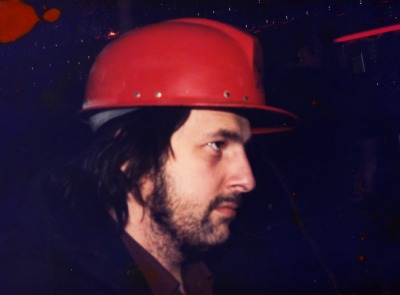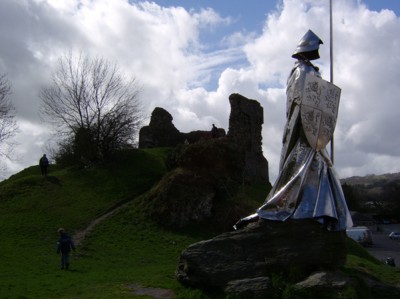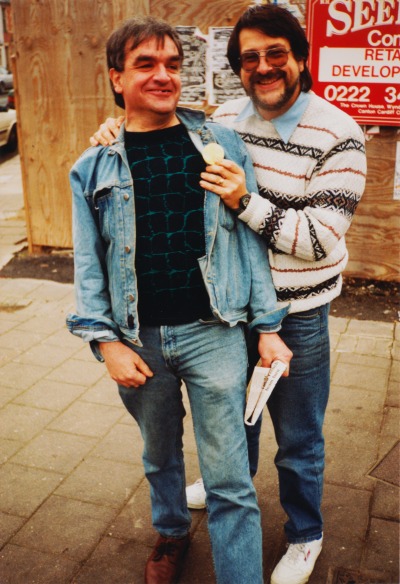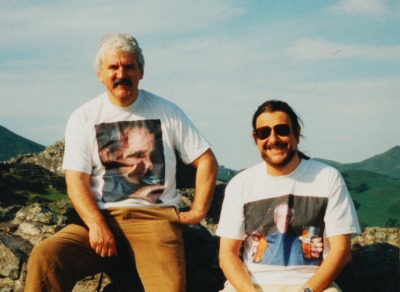 Rhobert ap Steffan In the early hours of Tuesday 11th of January 2012, Wales lost one of her most patriotic sons, Rhobert ap Steffan. Born in Hove, Sussex in 1948 of Welsh parents, the late Rev. Stanley & Mrs. Muriel Hinton, he was brought up and schooled in that proud South Wales valleys town, Treorci, a coalmining epicentre of our age-old struggle for cultural and political survival. He was a high spirited, warmhearted, likeable personality who thoroughly enjoyed socializing and a good old banter with his many friends and associates. It was through this very warm-heartedness that he gravitated, naturally, towards that early Plaid Cymru stalwart and character, Glyn James. Glyn became a life-long friend and welcomed him into the arms of the Plaid. He joined the party in the early 60’s and because of his rebel spirit and his (very) vocal advocacy of the inalienable rights of nations to self determination; he acquired the nickname of ‘Castro’ and was affectionately known as such throughout his life. The radical nature of his Welsh politics was triggered by two key events, the first being the 1965 enforced evacuation of the Welsh-speaking village of Capel Celyn in North Wales’ Tryweryn Valley, drowned to supply Liverpool industry with water. This took place despite there being viable alternatives, despite massive demonstrations and despite total Welsh parliamentary opposition. The other, seminal, event followed close on, in 1966, when an unsafe coal-tip slid into Aberfan’s Pantglas Junior School, near Merthyr Tudful, killing 116 children and 12 adults, as a result of what he considered criminal negligence by the National Coal Board. In 1966 he visited Dublin to commemorate the 50th anniversary of the 1916 Easter Rising, following this up with active participation in the 1969 Anti-Investiture Campaign. seeing in all the fawning and show-biz pageantry a sycophantic celebration of his nation’s domination by another. A friend of Julian Cayo Evans and other leaders of the Free Wales Army, he was never openly implicated in its clandestine activities, preferring to put his skills to good use staging protests and rallies. Tired of all this, and of the pressure put upon him because of his radical views, he decided to get away from it all and fulfill an oft-expressed ambition. He followed in the wash of the Mimosa and sailed, in a cargo ship, to Patagonia, the Gwladfa of legend. After a year of many adventures among the welcoming locals (including being detained by police as a suspected communist guerilla whilst hitching through the land!), he returned to Wales with perfect Welsh flowing from his lips, despite having left his nation as a monoglot English speaker. His next step was to qualify as a teacher of art which he taught, through the medium of Welsh and with rewarded success, in West Wales as Head of the Art Department in Llanymddyfri Comprehensive School, It was after this, in the mid-seventies, that he met, on the Maes of the Cricieth Eisteddfod, his future wife, supporter and love of his life, Marilyn, with whom he had three children, Iestyn, Rhys and Sioned. Throughout his career and afterwards he worked tirelessly to support the Local Government and Parliamentary candidates of Plaid Cymru. He also stood as a council candidate himself, on a number of occasions. Other worthy organisations supported by Rhobert at various periods of his life included the Swansea based Young Nationalist Association, Y Gweriaethwyr, Cofiwn and Cymdeithas yr Iaith Gymraeg. Working with the community, Rhobert was the inspiration and driving force behind the project to commission Toby and Gideon Petersen to create the inspiring stainless steel memorial to Llywelyn ap Gruffydd Fychan, erected by the remains of Llanymddyfri castle. Llywelyn had led English forces a merry dance to allow Owain Glyndwr to escape the forces of England’s King Henry IV. As punishment for his actions, Llywelyn was condemned to be executed in the town square. (Llywelyn was hung, drawn, and then, before he was quite dead, his stomach was cut out and cooked in front of him. He was then quartered.) In the same vein, Rhobert was a member of the organising group of the Owain Lawgoch Society, whose wish was to build a permanent memorial to Owain, who was a grand nephew of Prince Llywelyn the Last and recognised by the King of France as Prince of Wales. (After a lifetime of fighting on the side of the French King, the Scot Jon Lamb, acting on the orders of the Regent of England assassinated him. Three times Owain’s sea-borne invasion of Wales was thwarted by storms. He was murdered whilst besieging the castle of Mortagne sur Gironde in 1378.) The statue campaign was successful and it was unveiled, near the church of Saint-Léger in Mortagne, by Rosemary Butler AM, Chair of the National Assembly’s Culture Committee, in 2003. As you have, no doubt, gathered by now, Rhobert’s contributions to the Welsh cause, be they based within or outside of Plaid Cymru, were multifarious; indeed, they prove almost impossible to list in full. He was an invaluable canvasser for Adam Price MP and Rhodri Glyn AM, and contributed immensely to the politics of the Llangadog ward, for which he was twice a candidate. Realising the value of publicity in the successful passing of a message to the public, he was one of the prime organisers of the campaign to encourage people to ignore the 2001 Census forms, since they contained no tick box acknowledging Welsh Nationality. Rhobert and a doughty band of patriots journeyed through villages and towns, the length and breadth of Wales, encouraging people to stuff their Census forms into a coffin, to be buried ‘somewhere’ after its last stop outside the National Assembly. Very many forms were stuffed into the coffin, but no prosecutions resulted and the 2011 census included the ‘Welsh’ tick box – a direct result, perhaps? After retiring early from teaching, he played an important part in the development of Cambria Magazine, to which he was appointed ‘Editor at Large’ and it was with the then editor and founder, Henry Jones Davies, that the idea of establishing an annual Saint David’s Day Parade through Cardiff was mooted, then swiftly realised. The Parade, ‘Y Gorymdaith Gwyl Dewi’ is now very large indeed, with representatives from the other Celtic nations taking part. In fact, it now rivals that taking place through Dublin on Saint Patrick’s Day. Throughout his political life, Rhobert maintained a huge interest in the affairs of the other Celtic nations, with many a visit and cultural link to Brittany, Ireland, Cornwall and the Gaelic- speaking islands of Scotland. He had always planned a return to Y Wladfa, and in 2008 he fulfilled his ambition. Mencap Cymru, the charity that makes a difference to the lives of adults and children with learning difficulties, had organised a sponsored walking trip through the Southern Andes to raise funds. All taking part had to raise at least £3,500, but Rhobert managed nearly £10,000. After the trek, he stayed on to make a very personal gift of gratitude to the people for teaching him Welsh by distributing copies of the, newly published, Encyclopaedia of Wales to libraries and schools. He was quoted in a local Carmarthen paper thus “I will be there as a kind of unofficial Welsh ambassador and will try to help strengthen the ties between Y Wladfa and the ‘Old Country’. I spent a year in Y Wladfa in order to learn Welsh. I worked in a big ‘Estancia’ (ranch) near Trefelin in front of the Andes in Cwm Hyfryd, I spoke Welsh within a few months – I had no choice as almost no one spoke English!” Prior to 2010, not once, in 40 years, did he miss the annual commemoration of the death of our last prince, Llywelyn ap Gruffudd, at the hands of English forces on the 11th December 1282. This is held around a remembrance column in Cilmeri, close to where he was killed. It was obvious that something was seriously amiss when he did not turn up in 2010. It was he, after all, who had done so much to convene the rally over the years. What most present didn’t know was that he had just been diagnosed with a particularly virulent form of cancer and had but a month to live. Keep a place for us by the bar in Tir na Nòg, Castro…. You are sadly missed. John Page and Gareth ap Siôn
Rhobert ap Steffan In the early hours of Tuesday 11th of January 2012, Wales lost one of her most patriotic sons, Rhobert ap Steffan. Born in Hove, Sussex in 1948 of Welsh parents, the late Rev. Stanley & Mrs. Muriel Hinton, he was brought up and schooled in that proud South Wales valleys town, Treorci, a coalmining epicentre of our age-old struggle for cultural and political survival. He was a high spirited, warmhearted, likeable personality who thoroughly enjoyed socializing and a good old banter with his many friends and associates. It was through this very warm-heartedness that he gravitated, naturally, towards that early Plaid Cymru stalwart and character, Glyn James. Glyn became a life-long friend and welcomed him into the arms of the Plaid. He joined the party in the early 60’s and because of his rebel spirit and his (very) vocal advocacy of the inalienable rights of nations to self determination; he acquired the nickname of ‘Castro’ and was affectionately known as such throughout his life. The radical nature of his Welsh politics was triggered by two key events, the first being the 1965 enforced evacuation of the Welsh-speaking village of Capel Celyn in North Wales’ Tryweryn Valley, drowned to supply Liverpool industry with water. This took place despite there being viable alternatives, despite massive demonstrations and despite total Welsh parliamentary opposition. The other, seminal, event followed close on, in 1966, when an unsafe coal-tip slid into Aberfan’s Pantglas Junior School, near Merthyr Tudful, killing 116 children and 12 adults, as a result of what he considered criminal negligence by the National Coal Board. In 1966 he visited Dublin to commemorate the 50th anniversary of the 1916 Easter Rising, following this up with active participation in the 1969 Anti-Investiture Campaign. seeing in all the fawning and show-biz pageantry a sycophantic celebration of his nation’s domination by another. A friend of Julian Cayo Evans and other leaders of the Free Wales Army, he was never openly implicated in its clandestine activities, preferring to put his skills to good use staging protests and rallies. Tired of all this, and of the pressure put upon him because of his radical views, he decided to get away from it all and fulfill an oft-expressed ambition. He followed in the wash of the Mimosa and sailed, in a cargo ship, to Patagonia, the Gwladfa of legend. After a year of many adventures among the welcoming locals (including being detained by police as a suspected communist guerilla whilst hitching through the land!), he returned to Wales with perfect Welsh flowing from his lips, despite having left his nation as a monoglot English speaker. His next step was to qualify as a teacher of art which he taught, through the medium of Welsh and with rewarded success, in West Wales as Head of the Art Department in Llanymddyfri Comprehensive School, It was after this, in the mid-seventies, that he met, on the Maes of the Cricieth Eisteddfod, his future wife, supporter and love of his life, Marilyn, with whom he had three children, Iestyn, Rhys and Sioned. Throughout his career and afterwards he worked tirelessly to support the Local Government and Parliamentary candidates of Plaid Cymru. He also stood as a council candidate himself, on a number of occasions. Other worthy organisations supported by Rhobert at various periods of his life included the Swansea based Young Nationalist Association, Y Gweriaethwyr, Cofiwn and Cymdeithas yr Iaith Gymraeg. Working with the community, Rhobert was the inspiration and driving force behind the project to commission Toby and Gideon Petersen to create the inspiring stainless steel memorial to Llywelyn ap Gruffydd Fychan, erected by the remains of Llanymddyfri castle. Llywelyn had led English forces a merry dance to allow Owain Glyndwr to escape the forces of England’s King Henry IV. As punishment for his actions, Llywelyn was condemned to be executed in the town square. (Llywelyn was hung, drawn, and then, before he was quite dead, his stomach was cut out and cooked in front of him. He was then quartered.) In the same vein, Rhobert was a member of the organising group of the Owain Lawgoch Society, whose wish was to build a permanent memorial to Owain, who was a grand nephew of Prince Llywelyn the Last and recognised by the King of France as Prince of Wales. (After a lifetime of fighting on the side of the French King, the Scot Jon Lamb, acting on the orders of the Regent of England assassinated him. Three times Owain’s sea-borne invasion of Wales was thwarted by storms. He was murdered whilst besieging the castle of Mortagne sur Gironde in 1378.) The statue campaign was successful and it was unveiled, near the church of Saint-Léger in Mortagne, by Rosemary Butler AM, Chair of the National Assembly’s Culture Committee, in 2003. As you have, no doubt, gathered by now, Rhobert’s contributions to the Welsh cause, be they based within or outside of Plaid Cymru, were multifarious; indeed, they prove almost impossible to list in full. He was an invaluable canvasser for Adam Price MP and Rhodri Glyn AM, and contributed immensely to the politics of the Llangadog ward, for which he was twice a candidate. Realising the value of publicity in the successful passing of a message to the public, he was one of the prime organisers of the campaign to encourage people to ignore the 2001 Census forms, since they contained no tick box acknowledging Welsh Nationality. Rhobert and a doughty band of patriots journeyed through villages and towns, the length and breadth of Wales, encouraging people to stuff their Census forms into a coffin, to be buried ‘somewhere’ after its last stop outside the National Assembly. Very many forms were stuffed into the coffin, but no prosecutions resulted and the 2011 census included the ‘Welsh’ tick box – a direct result, perhaps? After retiring early from teaching, he played an important part in the development of Cambria Magazine, to which he was appointed ‘Editor at Large’ and it was with the then editor and founder, Henry Jones Davies, that the idea of establishing an annual Saint David’s Day Parade through Cardiff was mooted, then swiftly realised. The Parade, ‘Y Gorymdaith Gwyl Dewi’ is now very large indeed, with representatives from the other Celtic nations taking part. In fact, it now rivals that taking place through Dublin on Saint Patrick’s Day. Throughout his political life, Rhobert maintained a huge interest in the affairs of the other Celtic nations, with many a visit and cultural link to Brittany, Ireland, Cornwall and the Gaelic- speaking islands of Scotland. He had always planned a return to Y Wladfa, and in 2008 he fulfilled his ambition. Mencap Cymru, the charity that makes a difference to the lives of adults and children with learning difficulties, had organised a sponsored walking trip through the Southern Andes to raise funds. All taking part had to raise at least £3,500, but Rhobert managed nearly £10,000. After the trek, he stayed on to make a very personal gift of gratitude to the people for teaching him Welsh by distributing copies of the, newly published, Encyclopaedia of Wales to libraries and schools. He was quoted in a local Carmarthen paper thus “I will be there as a kind of unofficial Welsh ambassador and will try to help strengthen the ties between Y Wladfa and the ‘Old Country’. I spent a year in Y Wladfa in order to learn Welsh. I worked in a big ‘Estancia’ (ranch) near Trefelin in front of the Andes in Cwm Hyfryd, I spoke Welsh within a few months – I had no choice as almost no one spoke English!” Prior to 2010, not once, in 40 years, did he miss the annual commemoration of the death of our last prince, Llywelyn ap Gruffudd, at the hands of English forces on the 11th December 1282. This is held around a remembrance column in Cilmeri, close to where he was killed. It was obvious that something was seriously amiss when he did not turn up in 2010. It was he, after all, who had done so much to convene the rally over the years. What most present didn’t know was that he had just been diagnosed with a particularly virulent form of cancer and had but a month to live. Keep a place for us by the bar in Tir na Nòg, Castro…. You are sadly missed. John Page and Gareth ap Siôn  “Rhobert, with the support of the community, was the inspiration for the project to commission Toby and Gideon Petersen to create a memorial in steel to Llywelyn ap Gruffudd Fychan which can now be seen by the ruins of Llandovery Castle. “
“Rhobert, with the support of the community, was the inspiration for the project to commission Toby and Gideon Petersen to create a memorial in steel to Llywelyn ap Gruffudd Fychan which can now be seen by the ruins of Llandovery Castle. “ 

Skip to content
